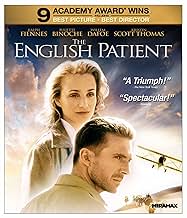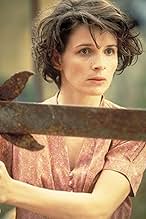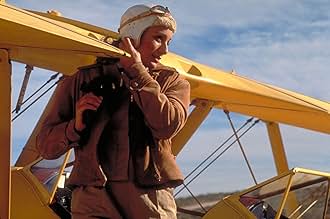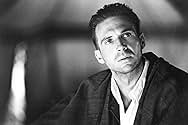À la fin de la Seconde Guerre mondiale, une jeune infirmière s'attache à la victime d'un accident d'avion, grièvement brûlé, et dont le passé, raconté en flash-backs, recèle une histoire d'a... Tout lireÀ la fin de la Seconde Guerre mondiale, une jeune infirmière s'attache à la victime d'un accident d'avion, grièvement brûlé, et dont le passé, raconté en flash-backs, recèle une histoire d'amour fatale.À la fin de la Seconde Guerre mondiale, une jeune infirmière s'attache à la victime d'un accident d'avion, grièvement brûlé, et dont le passé, raconté en flash-backs, recèle une histoire d'amour fatale.
- Director
- Writers
- Stars
- A remporté 9 oscars
- 62 victoires et 78 nominations au total
Avis en vedette
I always appreciated this movie, although the genre is not my typical style (I never watched Titanic for instance, and am not planning to).
The English Patient grips because it shows how people can be different when they are in an exotic environment as opposed when they are 'home' (Katherine), it shows how destructive love can be in a slow, strong and utterly painful way, it excites because of the extremely passionate affair, the pain of the one(s) who leave behind, how pointless one can feel to move on.
The photography is just stunning, not to mention the play of the actors. The pace is slow, but timely, and that does justice to the book, the timeline, and the depth/development of the characters. To put this in 110 minutes (as some seem to suggest here) would amputate the multi-layeredness of this movie. People tend to have difficulties with the pace of movies... as if they are in a rush to get to work.. hey - get a life ! ;-) enjoy...
I give this movie 4.5 out of 5.
This is quite a modern epic. It has the running time of an epic, it has the gorgeous cinematography of an epic, it has the acting of an epic and it has a story of love (lust) against the backdrop of major events in history. Even though it changes or leaves out a significant amount of the original novel it still manages to be a great mix of passionate desire and mystery. The mystery of the story is represented by the thief Caravaggio who casts light on what he knows of de Almásy's past (as he sees it) while the love story is unfolded as it develops in a passionate affair between him and Katherine, a colleagues' wife. The story is compelling enough to carry the long running time, at times the pace seems a little slow and when I saw it in my local multiplex there were some moments where large portions of the audience seemed to be shifting in their seats.
The love' of the story was interesting as it seems to be contrasted with Hana's relationship with Kip the bomb disposal expert. While de Almásy's relationship with Katherine starts as lust and desire before growing into what seems to be love (or could be grief at the result of their affair), Hana's is portrayed as purer and more careful as she fears those she loves will die. This difference helped me see that the film did want to show the destructive power of lust and affairs, however the fact that the central relationship was based more on lust than love took away from the emotional core of the story.
The acting is almost impeccable. Fiennes is excellent even when he is lost behind an unrecognisable mask of burnt flesh. Thomas is actually very good, I find she tends to be very wooden in some things but this type of very English character brings the best out of her. Binoche is excellent as Hana and carries the heart of the film. Dafoe is truly excellent - his element of the story is the mystery and he does it well. He is a great actor and deserves to be in things this good. The support cast include plenty of good actors including Colin Firth, Jurgen Prochnow and Naveem Andrews.
The film is beautifully shot - even though it's all a bit too picturesque to be real! However the director can handle himself well with many different scenes - a tense bomb diffusal, a passionate love scene, a dangerous sand storm etc. Overall the slow pace may frustrate some younger audiences but this is a really good film that draws it's values from classy sources.
"The English Patient", based on a novel by the same name by Michael Ondaatje, is like "The Godfather: Part II" (1974) in the sense of how it's constructed. It's a blending of two stories: the past and the present and it all revolves around the titular character: an English patient in the post years of World War Two. Ralph Fiennes plays the English patient, who has been scarred for life by a plane crash, and being taken care of in an isolated church by a single nurse played marvelously by Juliette Binoche. Apart from bonding with her raspy-voiced, troubled patient, Binoche comes to learn about his past when a stranger (Willem Dafoe) arrives and the two men appear to know each other.
That's just one of the two beautifully crafted stories that shape this film. The other one, told in flashback, is the patient's past, before he was scarred and dying in a bed. The story of the present mixed with the patient's past and his love affair that tragically changed his life forever.
To be blunt, "The English Patient" is a love story blended with a sweeping epic sensation and it blends magnificently. What I really admired about the love story between Ralph Fiennes and Kristin Scott Thomas was how passionate, how obsessive, how enchanting it was shown on screen. Usually in love stories, such as Minghella's later "Cold Mountain" (2003), the romantic elements seem far more lustful than obsessive to me. Some of the love scenes feature elements that may tend to be associated more with lust than love, but still, because it is so well developed and not rushed and not exploited out of proportion, we can believe that there is a sure, true love between these characters. It reminded me a lot of "Vertigo" (1958) in how well the filmmakers and performers convinced us that these were two actual human beings who truly fell in love with each other.
Performances all around were great. I was especially enthralled by the performance by Juliette Binoche, who took home the Oscar for her performance the following year. I also liked Willem Dafoe playing the sort of cynical, questionable character that he's always quintessential at playing. And of course I can't leave out Fiennes and Scott Thomas and their portrayals of two very passionate lovers.
Despite my enormous enthusiasm for this epic, I would be dishonest if I were to describe it as a perfect film. There are two flaws that I cannot glance over. Number one, it is a little too long and the reason for this is my second complaint, there are a few unnecessary subplots. I was not enchanted or particularly interested with the second love story between Binoche and a bomb specialist played by Naveen Andrews. My research has led me to assume that this plot element comes from the original book and I'm sure it worked perfectly in there, but in the film, it just seems a little distracting and the relationship between the two characters didn't fascinate me. I was far more interested by Fiennes character and his relationships with his two leading actresses.
Nevertheless, these two flaws are easily forgivable even if they do slow things down a bit. Those put aside, "The English Patient" is an extraordinary achievement of film-making. To me, it was sort of like an insane mix up between "Casablanca" (1942) and "Lawrence of Arabia" (1962), two remarkable and better films, and this effective blend proved to be well worth my time. It is a real shame that Anthony Minghella has left us. For he was a truly gifted filmmaker. This is all the evidence anybody needs.
Oscars Best Picture Winners, Ranked
Oscars Best Picture Winners, Ranked
Le saviez-vous
- AnecdotesThe Germans who shoot at Almásy's plane at the beginning were actually tourists roped into the production because they couldn't afford any more extras.
- GaffesKatharine Clifton (Scott-Thomas) explains to Count László Almásy (Fiennes), that her husband is map making in Ethiopia. The year at this point is 1939, and the country was known as Abyssinia until 1945.
- Citations
Katharine Clifton: My darling. I'm waiting for you. How long is the day in the dark? Or a week? The fire is gone, and I'm horribly cold. I really should drag myself outside but then there'd be the sun. I'm afraid I waste the light on the paintings, not writing these words. We die. We die rich with lovers and tribes, tastes we have swallowed, bodies we've entered and swum up like rivers. Fears we've hidden in - like this wretched cave. I want all this marked on my body. We are the real countries. Not boundaries drawn on maps with the names of powerful men. I know you'll come carry me out to the Palace of Winds. That's what I've wanted: to walk in such a place with you. With friends, on an earth without maps. The lamp has gone out and I'm writing in the darkness.
- Générique farfeluDisclaimer in end credits: "While a number of the characters who appear in this film are based on historical figures, and while many of the areas described - such as the Cave of Swimmers and its surrounding desert - exist and were explored in the 1930s, it is important to stress that this story is a fiction and that the portraits of the characters who appear in it are fictional, as are some of the events and journeys."
- Bandes originalesYes! We Have No Bananas
Words and Music by Frank Silver and Irving Cohn (as Irving Conn)
Published by Skidmore Music Co., Inc.
Meilleurs choix
Détails
- Date de sortie
- Pays d’origine
- Sites officiels
- Langues
- Aussi connu sous le nom de
- The English Patient
- Lieux de tournage
- sociétés de production
- Consultez plus de crédits d'entreprise sur IMDbPro
Box-office
- Budget
- 27 000 000 $ US (estimation)
- Brut – États-Unis et Canada
- 78 676 425 $ US
- Fin de semaine d'ouverture – États-Unis et Canada
- 278 439 $ US
- 17 nov. 1996
- Brut – à l'échelle mondiale
- 231 976 425 $ US
- Durée2 heures 42 minutes
- Couleur
- Mixage
- Rapport de forme
- 1.85 : 1








































